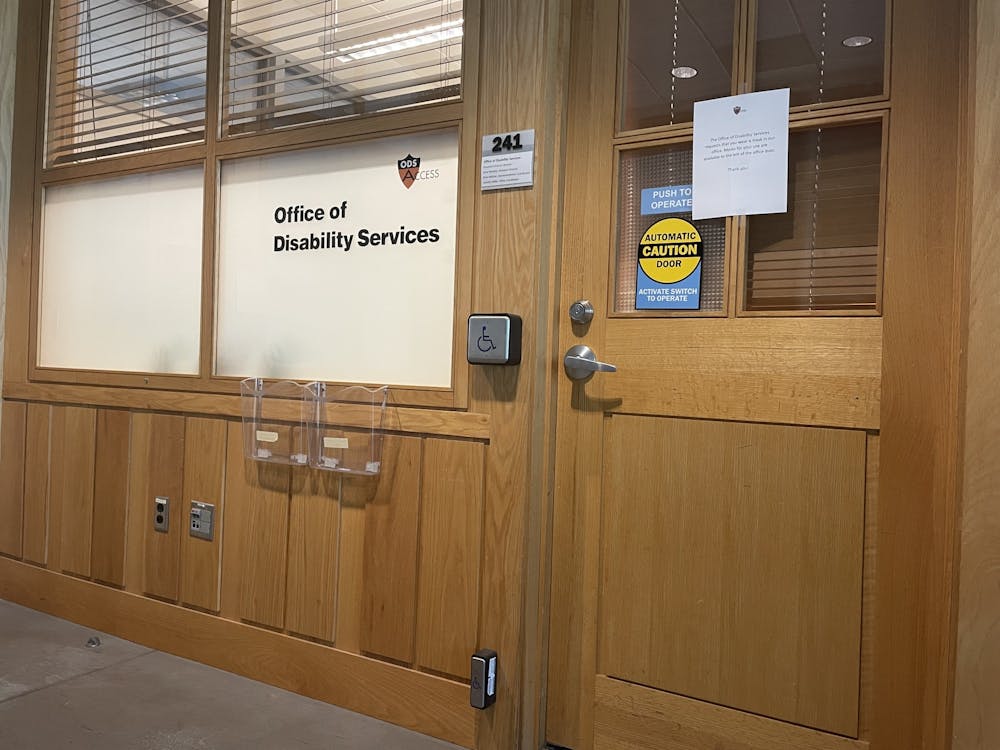How do students get accommodations on campus? The Daily Princetonian spoke to administrators who supervise the accommodation process and students who have experienced the process themselves to understand the Office of Disability Services’ (ODS) ability to meet students’ needs.
According to Liz Erickson, the Director of Disability Services at ODS, the main objective of ODS is to “[ensure] equal access to Princeton’s curricular and co-curricular opportunities for students with disabilities by approving and facilitating reasonable accommodations.”
In order to receive accommodations for their disabilities, students must contact ODS. Accommodations can be made for housing, school work, or other purposes. In an interview with the ‘Prince,’ Erickson said, “ODS has established policies and procedures for accommodating students with disabilities to align with applicable laws and overall University policies. This creates a framework to guide our work and ensure that we are providing the best service possible for students.”
Multiple students told the ‘Prince’ that they have received appropriate accommodations through this process. Leila Granier ’26, who received housing accommodations for asthma, said that the accommodations she received were sufficient. However, she qualified this, noting “asthma requires a pretty simple accommodation.”
Keilly Ponce-Merida ’25 discussed her experience with receiving accommodations through the ODS for fibromyalgia, a little-understood chronic disorder that causes pain and fatigue, saying that the ODS helped her accept and understand her condition better. “They helped me see the obstacles that I faced for what they were, when other entities can and do just dismiss fibro a lot of the time,” she told the ‘Prince.’
Harper Chambers ’24 said he had a similarly positive experience. In an interview with the ‘Prince,’ he described how ODS was supportive and crucial in guiding him to seek his initial diagnoses for autism spectrum disorder (ASD) and generalized anxiety disorder (GAD). ODS also helped him receive approval for necessary accommodations such as extended time and the provision of a “reduced distraction” exam environment.
At the same time, students described that the process itself of applying for accommodations can be slightly complicated. Granier, for example, said that she did not know she could receive accommodations as an incoming first-year until right before the deadline. “This was a bit stressful but it worked out in the end,” she explained. “I called ODS because I was concerned I wouldn’t have documentation in on time, and they were super kind and generous about that.”
The process of receiving accommodations begins with students submitting accommodation requests along with documentation from a professional for review. Following this initial step, students typically meet with the ODS to discuss their approved accommodations. For accommodations regarding classes, students must then also request for instructors to be notified of these approved accommodations and discuss with the instructor themselves.

Ponce-Merida noted that although her experience of getting approved for her accommodations was easier than she expected, “all the extra steps every semester or having to advocate for yourself throughout the process to actually be able to use the accommodations can be extremely difficult and tiring.”
Rather than encountering complications with the ODS, she has faced more issues with professors not being very flexible and the consequences of using her accommodation to miss class when in great pain: “When I do miss class, it tends to add a lot of stress (which leads to more pain and then a terrible cycle), and so I try not to use it. This is because although I’m allowed to miss class, there is no requirement for the professors to accommodate me any further, so when there is no recording of the class, no class slides, and no notes to look over, it is very difficult to catch up.”
Ponce-Merida claimed that “getting others to implement the accommodations also makes them less accessible in practice.”
However, students noted how ODS has helped them ensure that others are following their accommodations. Chambers gave the example of a time when he reached out to the ODS because of an issue with his professor shouting rather than using a microphone. He said that by the next class, his professor had a microphone.

Chambers stated that “receiving accommodations can also be an ongoing process of adding and finding accessibility,” and he felt that the ODS has offered their continuous support through this process.
Vice Provost for Institutional Equity and Diversity Michelle Minter acknowledged that disability accommodations require constant work and growth. “As our student body expands and changes, the needs of students with disabilities continue to evolve. The University has a responsibility to provide reasonable access and an equitable experience,” she said.
Chambers added, “Creating an accessible campus is a two pronged approach — providing accommodations on an administrative level, and improving access, visibility, and inclusion on the level of community, advocacy, and identity.”
Jeannie Kim is a Features and News staff writer for the ‘Prince.’ She can be reached at jk5876@princeton.edu.
Rebecca Cho is a News staff writer for the ‘Prince.’ She can be reached at rc5928@princeton.edu.








